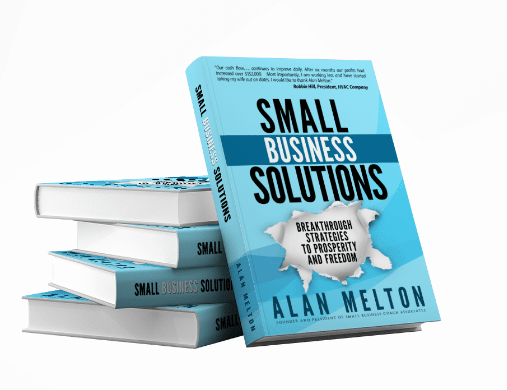VIEW BY TOPIC
- Finding Customers
- Business Systems
- Managing Employees
- Leadership
- Managing Money
Related Posts

Ready to Grow Your Business Fast?
Here’s How I Grew Five Businesses, and Eventually Sold One to a Fortune 500 Company.

How Does Content Marketing Help Small Businesses?
There’s a considerable difference between big businesses and small businesses regarding their resources and know-how with content marketing, and this affects how successful their campaigns are. Of course, it’s only natural to think that larger companies are going to be more successful at content marketing campaigns because they have more money to invest in the effort. It’s even easier to become discouraged, thinking “let’s just leave content marketing to the big guys” — but this is a mistake.
Small businesses can make excellent headway with content marketing thanks to the internet. Small businesses may not have substantial marketing budgets or big teams to execute their marketing strategies. However, they can still increase sales, attract new customers, and grow brand awareness with a bit of gumption.
Don’t allow what your small business lacks to stop you from taking advantage of content marketing. Instead, focus on making strategic content creation and distribution choices that are true to your brand and in alignment with your target audience’s desires.
Here’s why content marketing is a good choice for small businesses.
Scale Your Marketing Strategy
First, content marketing can boost your overall marketing strategy. Not only will you be required to reevaluate your company goals, but you’ll also have to establish clear marketing objectives that support your overarching marketing strategy.
When you set company-wide goals, attach them to smaller marketing plans and define each department’s role, it ensures each person has direction, productivity gets better, and your business’s bottom line improves. These goals are generally going to be based on problems that need to be solved, and you can even take a visual approach when defining these goals with a visual problem-solving flowchart:
- First, draw a shape that represents the problem you’re trying to solve.
- Then draw a shape that represents a goal or a decision, and ask yes-or-no questions concerning these goals.
- Based on these answers, you’ll connect the possible paths you can take to work through the steps and individual processes.
- Keep going down these paths and asking questions until you’re able to narrow them down to goals that could feasibly solve the original problem.
- Select the goal you’d like to commit to, and then pursue it. If it doesn’t ultimately work, you can review this process and analyze what might have gone wrong, as well as select a new, more viable goal.
Additionally, it’s crucial to map out how you’re going to track your marketing team’s productivity and how they work together with other departments. By doing so, you create bandwidth in your business for content marketing and establish a workflow that supports a solid customer experience with your marketing.
Next, content marketing can make it easier to build a customer base.
Build a Customer Base
Instead of relying on word-of-mouth or traditional marketing efforts, you can reach more people with good content.
You can publish content across various channels and platforms, extending your reach beyond local, state, and even international lines. In addition, you can build a community of people that support your business and are loyal advocates of your brand with a solid content marketing strategy.
Furthermore, not only can you create a customer base, but you can learn more about it through content marketing.
Learn More About Your Target Audience

When you create and distribute content, you have access to more data about your target audience and how they engage with your brand and business. It’s integral to not just your content marketing strategy but your overall marketing goals and business plan, to continually learn about your target audience.
By setting up data analytics tools to track the performance of your content and how your target audience engages with it, you’ll be able to make insightful adjustments to your strategy when needed.
You also have more creative freedom in a small business content marketing strategy.
Exercise Creative Freedom
There is a lot of room for creativity in a small business’s content marketing strategy. The marketing department in a small business is usually a one-person show, a small team, or run by the owner.
You don’t have to get permission from someone higher up about content marketing decisions when you call the shots. Instead, you can take creative risks with content, experiment with various platforms, and try out different distribution methods at will.
Another way content marketing can help your small business is by establishing your brand as an expert.
Establish Your Brand as an Expert
You can establish your brand as an expert when you do content marketing right. By constantly churning out entertaining, educational, helpful, interactive content, you’ll have a better chance at establishing trust-filled relationships with members of your target audience.
Content can also be the difference between becoming a thought leader in your industry or remaining in the shadows of big businesses. Of course, you’ll want to make sure you truly know what you’re talking about, or you’ll get called out for it, and may achieve the opposite of your goals. Failure to understand your industry is one of the most grow brand awareness, so make sure you don’t look like a newbie or a chump by brushing up on industry knowledge.
Lastly, content marketing helps your small business work on brand consistency.
Work on Brand Consistency

Consistency is critical when building brand awareness. You want people to recognize your brand no matter how or where they encounter it. Ensuring your brand is represented the same in your content can help.
Content marketing helps you work on your brand consistency. You’ll have to nail down the messaging, brand voice, guidelines for visuals, and other brand elements you’ll include in your content to be as consistent as possible.
Ultimately, when you prioritize brand consistency in your content marketing, it’ll be easier for your target audience to identify your brand through your content, no matter the platform or channel.
Conclusion
Content marketing is beneficial to small businesses looking to scale their marketing strategies while staying within budget and within the realm of what their small teams can produce.
It can also help you build a sizeable customer base, learn more about your target audience, and establish your brand as a thought leader in your industry. It will take some time, but your small business can leverage content marketing effectively with a bit of creativity, brand consistency, and dedication.














